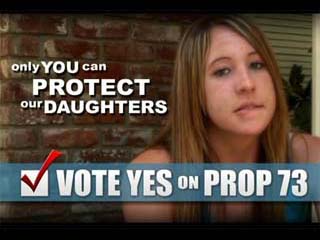
EDITORS’ NOTE: This is the second in a three-part series previewing the Nov. 8 election.
SACRAMENTO, Calif. (BP)–The argument is a simple one — in California, a teenage girl needs a parent’s permission to get her ears pierced, to get a flu shot and even to get an aspirin from the school nurse. Why, then, is she not required at least to notify her parents before getting an abortion?
Although more than 30 states have adopted laws requiring either parental consent or notification before a minor can obtain an abortion, California is not among them. That could change Nov. 8 when citizens there vote on Proposition 73, which would amend the state constitution to require at least one parent of a teenager under 18 to be notified before the girl obtains an abortion. If the parent does not agree to the procedure, the minor must then wait 48 hours.
The proposed law would have an exception for medical emergencies and would allow teen girls to bypass the law by getting permission from a juvenile court judge. The bypass clause, supporters say, is aimed at situations where teen girls live with abusive parents.
Abortion doctors would be required to notify parents and could be fined if they fail to do so.
“There are teenage girls right now, as young as 12 and 13, that are getting abortions,” Mike Spence, a spokesman for the California Parents Rights Coalition, told Baptist Press. “… Society has always recognized the role of parents in caring for their children. In California, you can’t get your body pierced…. You can’t get a Blockbuster video card without parental consent. This simply allows for notification for a very major surgery.”
This is not the first time California has tackled the issue. It previously had a parental consent law that required minors to obtain their parents’ permission. The law also had a judicial bypass. But the California Supreme Court struck it down in 1997, saying it violated the state constitution’s right to privacy guarantee. Proposition 73 has fewer teeth than that earlier law — it requires only notification, not consent — but it would nonetheless be a significant victory for pro-lifers in a fairly liberal state.
Delaware, Massachusetts and Rhode Island — all left-leaning states — have similar laws. In fact, both Massachusetts and Rhode Island have the much stronger consent laws.
“This is a real common sense initiative, but the pro-abortion advocates in the state are using lies and untruths in order to try and stop it,” Spence said. “They are, obviously, opposed to it.”
There is no guarantee that Proposition 73 will pass. Some polls have it winning, others show it losing. A Los Angeles Times poll conducted Oct. 26-31 showed it winning, 51-39 percent. But a Field Poll done Oct. 25-30 had it losing, 49-41 percent. Other polls have reflected that volatility.
Gov. Arnold Schwarzenegger, a pro-choice Republican, has endorsed Proposition 73. In addition, “Dr. Laura” Schlessinger, conservative talk-show host Laura Ingraham and actor/commentator Ben Stein have recorded radio ads supporting it.
The amendment defines abortion as the “death of the unborn child, a child conceived but not yet born.”
Spence said the amendment would “absolutely” reduce the number of teen abortions by bringing parents into the discussion.
“If you look at the statistics in other states, after implementation, there’s usually a drop in the number of abortions and pregnancies,” he said.
A victory also would be significant for the pro-life movement in both California and nationwide, he said.
“I think it would be an important step. It would show that voters in the state of California support reasonable limits on abortion,” he said. ” … It would be the nation’s biggest state passing a reasonable limit to what is usually an unlimited right. That’s always a plus for the movement.”
–30–
For more information about Proposition 73, visit www.caparentsrights.org or www.yeson73.net

















